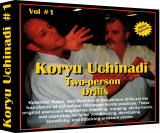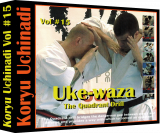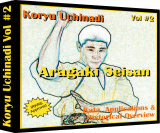Koryu Uchinadi Vol.16 Gyaku-Waza
DVD
Product SKU: KU-16
By Patrick McCarthy – International Ryukyu Karate Research Society
IRKRS Koryu Uchinadi Gyaku Waza "Escapes & Counters"
Before the advent of modern Karate, there existed a remarkable martial arts in Okinawa referred to as Ryukyu Kempo Toudi-Jutsu.
Simplifed for the purpose being put into Okinawa's turn-of-the-century school system to build robust bodies and militaristic mentalities, in support of Japan's escalating war machine, Ryukyu Kempo Toudi-Jutsu ultimately became influenced by Japanese Budo culture which transformed the revised practice into a sport and cultural recreation.
Koryu Uchinadi Kempo-Jutsu is a unique collection & functional re-interpretation of old-school tegumi grappling drills & those embryonic Fujian-based quanfa practices once secretly cultivated before the development of the modern tradition.
Re-systematized into a cohesive & completely application-based study, it came about as a result of researcher, author and master instructor, Patrick McCarthy, fusing together the principal teachings from many of this tradition's most celebrated pioneers.
Having studied the art since childhood, Patrick McCarthy is one of the few non-Japanese master-level instructors regularly invited to teach kata application, pressure point theory and the history of traditional Karate all over the world.
A former world karate champion, a published re-searcher and a professional teacher, McCarthy Hanshi spend years in Japan researching and developing a simple yet effective way through which to teach the functional application principles of kata.
Gyaku-waza is the art of protecting oneself against unprovoked acts of physical violence.
The term, Gyaku-waza, literally means reversal-techniques, and describes a group of close-quarter self-defense practices originally developed to be used against being violently seized and controlled by an aggressive opponent.
Dating back to a time before the development and propagation of modern styles, these old-school self-defense practices are based entirely upon those original empty-handed and one-against-one domestic acts of physical violence, which habitually plagued the 19th century southern Chinese culture, from where this art evolved.
Gyaku-waza represents the pathway between physical engagement, responding appropriately and controlling or submitting an opponent, without the use of lethal force.
Once cloaked in an iron-clad ritual of secrecy these time-honoured, and highly functional prescribed application practices, employ an impressive collection of fighting tactics ranging from percussive impact, joint manipulation, limb entanglement, nerve pressure and cavity seizing, to blood and air deprivation, balance displacement, and controlling an opponent in both a standing clinch and or on the ground.
The attack scenarios range from the classical wrist, hair and garment grabs, being seized from various standing positions, the dangerous clinch, headlock, full nelson, and various kinds of bear hugs, to different kinds of chokes, joint-locks and limb manipulations, single/double leg takedown, and defending oneself on the ground, including escaping the mount, passing the guard and dealing with back control, along with being punched and kicked in the face by the attacker while down.
From a defensive point of view, Gyaku-waza is a complete method in and of itself without the need for additional measures.
Gyaku-waza is presented at learning speed using passive resistance and from several angles in order to make it easy to identify and master each lesson.
Language: English
Running Time: 92 Minutes
IRKRS Koryu Uchinadi Gyaku Waza "Escapes & Counters"
Before the advent of modern Karate, there existed a remarkable martial arts in Okinawa referred to as Ryukyu Kempo Toudi-Jutsu.
Simplifed for the purpose being put into Okinawa's turn-of-the-century school system to build robust bodies and militaristic mentalities, in support of Japan's escalating war machine, Ryukyu Kempo Toudi-Jutsu ultimately became influenced by Japanese Budo culture which transformed the revised practice into a sport and cultural recreation.
Koryu Uchinadi Kempo-Jutsu is a unique collection & functional re-interpretation of old-school tegumi grappling drills & those embryonic Fujian-based quanfa practices once secretly cultivated before the development of the modern tradition.
Re-systematized into a cohesive & completely application-based study, it came about as a result of researcher, author and master instructor, Patrick McCarthy, fusing together the principal teachings from many of this tradition's most celebrated pioneers.
Having studied the art since childhood, Patrick McCarthy is one of the few non-Japanese master-level instructors regularly invited to teach kata application, pressure point theory and the history of traditional Karate all over the world.
A former world karate champion, a published re-searcher and a professional teacher, McCarthy Hanshi spend years in Japan researching and developing a simple yet effective way through which to teach the functional application principles of kata.
Gyaku-waza is the art of protecting oneself against unprovoked acts of physical violence.
The term, Gyaku-waza, literally means reversal-techniques, and describes a group of close-quarter self-defense practices originally developed to be used against being violently seized and controlled by an aggressive opponent.
Dating back to a time before the development and propagation of modern styles, these old-school self-defense practices are based entirely upon those original empty-handed and one-against-one domestic acts of physical violence, which habitually plagued the 19th century southern Chinese culture, from where this art evolved.
Gyaku-waza represents the pathway between physical engagement, responding appropriately and controlling or submitting an opponent, without the use of lethal force.
Once cloaked in an iron-clad ritual of secrecy these time-honoured, and highly functional prescribed application practices, employ an impressive collection of fighting tactics ranging from percussive impact, joint manipulation, limb entanglement, nerve pressure and cavity seizing, to blood and air deprivation, balance displacement, and controlling an opponent in both a standing clinch and or on the ground.
The attack scenarios range from the classical wrist, hair and garment grabs, being seized from various standing positions, the dangerous clinch, headlock, full nelson, and various kinds of bear hugs, to different kinds of chokes, joint-locks and limb manipulations, single/double leg takedown, and defending oneself on the ground, including escaping the mount, passing the guard and dealing with back control, along with being punched and kicked in the face by the attacker while down.
From a defensive point of view, Gyaku-waza is a complete method in and of itself without the need for additional measures.
Gyaku-waza is presented at learning speed using passive resistance and from several angles in order to make it easy to identify and master each lesson.
Language: English
Running Time: 92 Minutes
Reviews
There are yet no reviews for this product.





